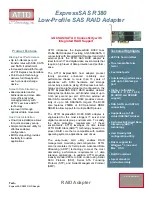
Pulse Input Adapters
Using the Pulse Input Adapter with the H21-001 HOBO Weather Station or
H21-002 HOBO Micro Station
Connecting the Input Adapter
Typical Setup
The adapter housing should be installed outside the logger enclosure. Be sure to follow the instructions
included with the logger to ensure that the logger is properly sealed where the sensor cable exits the
logger enclosure. Secure the adapter housing to the mast or sensor mounting arm. Excess cable should be
coiled and secured with cable ties.
When making a connection to a third-party sensor, take time to make sure that the connection is reliable.
The connection should be protected from rain, dirt, and direct exposure to the elements. The input cable
can be connected directly to screw terminals on the sensor or to sensor cables with the included wire nuts.
To use the wire nuts, strip about 1 cm (3/8") of insulation from the end of wires, taking care not to nick
the metal conductors. Then, twist the stripped wires together clockwise and then screw on the wire nut
clockwise. Check the connection by gently pulling on the wires to verify a solid mechanical connection.
Always strain-relief the connection to make sure that the connection is not broken by being jerked or
repeatedly worked back and forth.
Installation Considerations
•
If sensor cables are left on the ground, use a conduit to protect against animals, lawn mowers,
exposure to chemicals, etc.
•
Refer to the
HOBO Weather Station User’s Guide
or the
HOBO Micro Station User’s Guide
for
information about setting up complete stations.
Input Connections
The Pulse Input Adapter sensor has two input connections. The white wire (+) is powered at 3.3 V
through a 100 K
Ω
resistor. This power is supplied from the logger’s battery. The black wire (-) is
connected through the adapter to the logger’s ground connection.
Typical Setup of S-UCD-M006 with a Tipping Bucket Rain Gauge or Mechanical Contact Switch
The Contact Closure Pulse Input Adapter (S-UCD-M006) is designed to work with Tipping-Bucket Rain
Gauges and other devices with normally open, mechanical contact closure, switched outputs with a
maximum pulse frequency of 2 Hz. This sensor has a pre-set lockout time of 327 ms and is designed to
work with signals that must be de-bounced to be accurately measured.
Note
•
“Bounce” is a phenomenon where a single pulse may contain several false pulses or bounces.
De-bouncing a signal is typically required when measuring signals from mechanical switches,
contact closures, and reed switches.
The lockout time prevents bounce-induced false pulses from being counted as separate switch closures. If
your gauge has a counter display and battery, disconnect them and connect the Pulse Input Adapter in
their place. In most cases, the black and white wires can be connected directly to the relay output. (When
connecting to relay or switch contacts, polarity does not matter.)
Page 2 of 6























